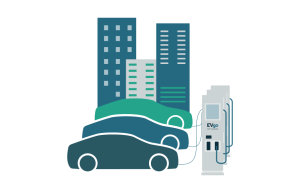Expanded EV Incentives for 2023
The U.S. expects to see a significant increase in new Electric Vehicle (“EV”) infrastructure projects thanks to a major piece of legislation passed in August of last year.

The Inflation Reduction Act of 2022 (“IRA”) was passed in order to address rising inflation by reducing the federal deficit, lowering prescription drug prices, and investing in clean domestic energy production. As part of the bill, the Federal government aims to raise nearly $750 Billion, with nearly $400 Billion authorized for spending on energy and climate change initiatives. As part of this spending package, Federal authorities have created several financial incentives for EV investment including tax credits, federal grants, and loans. Each incentive offers individuals and businesses ways to maximize their investments in new EV technology.
The various EV tax credits offer the most widely available incentive by giving businesses
and individuals a tax credit for purchasing and putting into service EVs meeting certain criteria. Individuals with a modified adjusted gross income within certain defined thresholds are eligible to receive a total tax credit of up to $7,500. A similar credit is available to businesses that purchase and put into service EVs, providing a maximum of $7,500 for vehicles under 14,000 pounds and a maximum of $40,000 for vehicles over 14,000 pounds. These tax credits depend on certain sourcing requirements for critical minerals and location requirements for final assembly which will be set out by the Treasury Department later this year.
In addition to the vehicle tax credits, the IRA also provides for a manufacturing EV tax
credit for certain qualified advanced energy projects. These projects include reequipping, expanding, or establishing certain manufacturing and industrial facilities for producing light-, medium-, and heavy-duty EVs, FCEVs, EV charging stations, and hydrogen fueling stations. Qualifying projects are eligible for up to a 30% tax credit for project investments.
The IRA has also expanded upon the Advanced Technology Vehicle Manufacturing Loan
Program (“ATVM Program”) which provides treasury rate loans to qualifying automotive and component manufacturers for certain EV projects. Through this program, automotive and component manufacturers work closely with the Department of Energy Loan Programs Office (“LPO”) in order to ensure that the project meets the necessary requirements Eligibility requirements include: Manufacturing eligible vehicles or components; building new facilities, improving existing facilities, and/or engineering integration related to the manufacture of ATVs or components; be located in the United States; and provide a reasonable prospect of repayment. By working with the LPO, a qualified manufacturer can tailor its project to the requirements of the ATVM Program in order to maximize the funding it can receive.
The final category of financial incentive is the IRA’s grant programs including the
Heavy-Duty Zero Emission Vehicle (ZEV) and Infrastructure grant, and the Port Electrification grant. These grant programs may cover up to 100% of the total project costs and are run by the Environmental Protection Agency (“EPA”). Each program has specific criteria for eligible contractors and recipients so those interested in potential funding through the grant should consult with legal counsel to determine whether they are eligible.
Through the IRA, the government is offering significant incentives for individuals and
businesses to invest in clean energy initiatives such as EVs. The BridgehouseLaw team is ready to assist those interested in taking advantage of these incentives by breaking down funding requirements and helping our clients maximize the return on their investments. If you would like to learn more about the different IRA EV incentives, please contact our office today.
